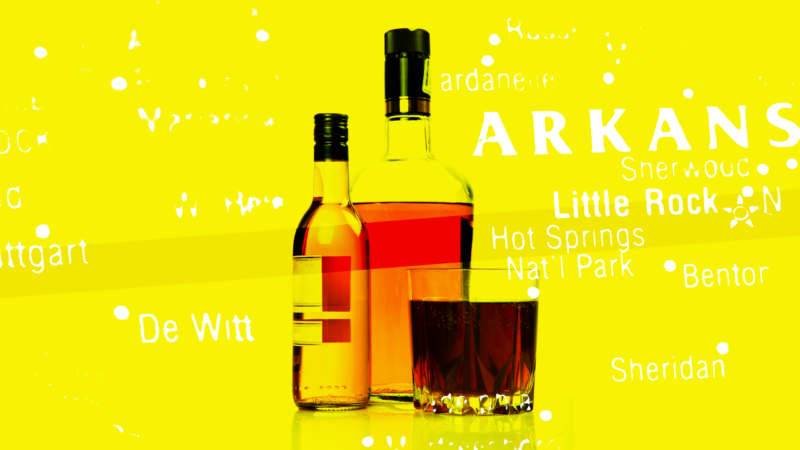Ga offline met de app Player FM !
Why We Can't Have Nice Things: Bootleggers, Baptists, and Ballots
Manage episode 375138420 series 3498470

Arkansas has some of the strangest liquor laws in the country—or at least the most politically contentious.
Unlike a lot of other places, the state allows counties to hold referendums to decide whether they will allow the retail sale of alcohol. That is, whether they will be "wet" or "dry." And when those elections take place, it's often existing liquor stores—the very businesses that earn money by selling booze—that campaign the hardest to keep county-level prohibition going.
And they often have a powerful, but unexpected ally: churches.
In the fourth episode of Why We Can't Have Nice Things, a new podcast series from Reason, we take a deep dive into the political dynamics that drive Arkansas' local alcohol legalization elections. Jeremy Horpedahl, an economist at the University of Central Arkansas, says public choice theory explains why special interests that might have very little in common sometimes team up to push protectionist regulations.
"What's especially powerful about this coalition is that you have the liquor stores which can provide the money to prevent legalization of alcohol sales," he says, "and the churches, which can provide the moral argument the public face of the campaign to keep these things, keep the rules, how they are."
Chris Swonger, CEO of the Distilled Spirits Council of the United States, says that arguments about morality are often used as cover when one faction or another wants regulations to boost their own competitive interests.
Once you know what to look for, there are "bootleggers" and "baptists" to be found just about everywhere.
Further reading for this week's episode:
"Bootleggers and Baptists: The Education of a Regulatory Economist," by Bruce Yandle
"Bootleggers, Baptists, and Ballots: Coalitions in Arkansas' Alcohol-Legalization Elections," by Jeremy Horpedahl
Check out the full range of the "Bootleggers and Baptists" phenomenon at Reason.com.
Find out which states allow spirits to be shipped directly to consumers' homes at ShipMySpirits.org, a project of the Distilled Spirits Council of the United States.
Written by Eric Boehm; produced and edited by Hunt Beaty; mixing by Ian Keyser; fact checking by Katherine Sypher
The post Why We Can't Have Nice Things: Bootleggers, Baptists, and Ballots appeared first on Reason.com.
10 afleveringen
Manage episode 375138420 series 3498470

Arkansas has some of the strangest liquor laws in the country—or at least the most politically contentious.
Unlike a lot of other places, the state allows counties to hold referendums to decide whether they will allow the retail sale of alcohol. That is, whether they will be "wet" or "dry." And when those elections take place, it's often existing liquor stores—the very businesses that earn money by selling booze—that campaign the hardest to keep county-level prohibition going.
And they often have a powerful, but unexpected ally: churches.
In the fourth episode of Why We Can't Have Nice Things, a new podcast series from Reason, we take a deep dive into the political dynamics that drive Arkansas' local alcohol legalization elections. Jeremy Horpedahl, an economist at the University of Central Arkansas, says public choice theory explains why special interests that might have very little in common sometimes team up to push protectionist regulations.
"What's especially powerful about this coalition is that you have the liquor stores which can provide the money to prevent legalization of alcohol sales," he says, "and the churches, which can provide the moral argument the public face of the campaign to keep these things, keep the rules, how they are."
Chris Swonger, CEO of the Distilled Spirits Council of the United States, says that arguments about morality are often used as cover when one faction or another wants regulations to boost their own competitive interests.
Once you know what to look for, there are "bootleggers" and "baptists" to be found just about everywhere.
Further reading for this week's episode:
"Bootleggers and Baptists: The Education of a Regulatory Economist," by Bruce Yandle
"Bootleggers, Baptists, and Ballots: Coalitions in Arkansas' Alcohol-Legalization Elections," by Jeremy Horpedahl
Check out the full range of the "Bootleggers and Baptists" phenomenon at Reason.com.
Find out which states allow spirits to be shipped directly to consumers' homes at ShipMySpirits.org, a project of the Distilled Spirits Council of the United States.
Written by Eric Boehm; produced and edited by Hunt Beaty; mixing by Ian Keyser; fact checking by Katherine Sypher
The post Why We Can't Have Nice Things: Bootleggers, Baptists, and Ballots appeared first on Reason.com.
10 afleveringen
Alle afleveringen
×Welkom op Player FM!
Player FM scant het web op podcasts van hoge kwaliteit waarvan u nu kunt genieten. Het is de beste podcast-app en werkt op Android, iPhone en internet. Aanmelden om abonnementen op verschillende apparaten te synchroniseren.




